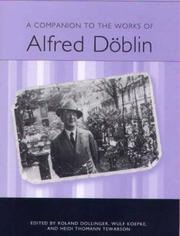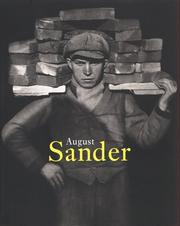| Listing 1 - 6 of 6 |
Sort by
|
Book

ISBN: 1282716743 9786612716744 3110217708 9783110217704 9783110217698 3110217694 9780854572229 0854572228 Year: 2009 Publisher: Berlin Boston
Abstract | Keywords | Export | Availability | Bookmark
 Loading...
Loading...Choose an application
- Reference Manager
- EndNote
- RefWorks (Direct export to RefWorks)
Döblin's texts, which range widely across contemporary discourses, are paradigms of the encounter between literary and scientific modernity. With their use of 'Tatsachenphantasie', they explode conventional language, seeking a new connection with the world of objects and things. This volume reassesses and reevaluates the uniquely interdisciplinary quality of Döblin's interdiscursive, factually-inspired poetics by offering challenging new perspectives on key works. The volume analyses not only some of Döblin's best-known novels and stories, but also neglected works including his early medical essays, political journalism and autobiographical texts. Other topics addressed are Döblin's engagement with German history; his relation to medical discourse; his topography of Berlin; his aestheticisation of his own biography and his relation to other major writers such as Heine, Benn, Brecht and Sebald. With contributions in English and in German by scholars from Germany and the United Kingdom, the volume presents insights into Döblin that are of value to advanced researchers and to students alike.
Modernism (Literature) --- Döblin, Alfred, --- Criticism and interpretation. --- Deblin, A., --- Poot, Linke, --- Doeblin, Alfred, --- דבלין, אלפרד, --- דעבלין, אלפרעד --- Döblin, Alfred --- Alfred Döblin, Modernism. --- Doblin, Alfred,

ISBN: 9781571131249 1571131248 9781571136169 1571134603 9786611801038 1281801038 1571136169 Year: 2004 Publisher: Rochester, N.Y. Camden House
Abstract | Keywords | Export | Availability | Bookmark
 Loading...
Loading...Choose an application
- Reference Manager
- EndNote
- RefWorks (Direct export to RefWorks)
Alfred Döblin (1878-1957) was one of the great German-Jewish writers of the 20th century, a major figure in the German avant-garde before the First World War and a leading intellectual during the Weimar Republic. Döblin greatly influenced the history of the German novel: his best-known work, the best-selling 1929 novel Berlin Alexanderplatz, has frequently been compared in its use of internal monologue and literary montage to James Joyce's Ulysses and John Dos Passos's Manhattan Transfer . Döblin's oeuvre is by no means limited to novels, but in this genre, he offered a surprising variety of narrative techniques, themes, structures, and outlooks. Döblin's impact on German writers after the Second World War was considerable: Günter Grass, for example, acknowledged him as "my teacher." And yet, while Alexanderplatz continues to fascinate the reading public, it has overshadowed the rest of Döblin's immense oeuvre. This volume of carefully focused essays seeks to do justice to such important texts as Döblin's early stories, his numerous other novels, his political, philosophical, medical, autobiographical, and religious essays, his experimental plays, and his writings on the new media of cinema and radio.Contributors: Heidi Thomann Tewarson, David Dollenmayer, Neil H. Donahue, Roland Dollinger, Veronika Fuechtner, Gabriele Sander, Erich Kleinschmidt, Wulf Koepke, Helmut F. Pfanner, Helmuth Kiesel, Klaus Müller-Salget, Christoph Bartscherer, Wolfgang Düsing.Roland Dollinger is associate professor of German at Sarah Lawrence College; Wulf Koepke is professor emeritus of German at Texas A&M University; Heidi Thomann Tewarson is professor of German at Oberlin College.
Döblin, Alfred --- Döblin, Alfred, --- Criticism and interpretation. --- Döblin, Alfred --- Deblin, A., --- Poot, Linke, --- Doeblin, Alfred, --- דבלין, אלפרד, --- דעבלין, אלפרעד --- LITERARY CRITICISM / European / German. --- 20th Century Literature. --- Alfred Döblin. --- Berlin Alexanderplatz. --- German-Jewish Writer. --- Internal Monologue. --- Literary Montage. --- Modernist Novelist. --- Social Commentary. --- Urban Life. --- Weimar Republic. --- Doblin, Alfred,
Book
ISBN: 3839463947 Year: 2022 Publisher: Bielefeld transcript Verlag
Abstract | Keywords | Export | Availability | Bookmark
 Loading...
Loading...Choose an application
- Reference Manager
- EndNote
- RefWorks (Direct export to RefWorks)
Alfred Döblins Spätwerk sowie seine Zeitschrift »Das Goldene Tor« haben eine zentrale Rolle bei der Konzeptionierung der Synthetischen Moderne. Nico Schmidtner nimmt vor diesem Hintergrund eine Neuordnung der Zeitschriftenlandschaft der deutschen Nachkriegszeit vor. Durch die Untersuchung der wechselvollen literarischen Konflikte Döblins liefert er einen tiefen Einblick in die literarisch-politischen Diskurse nach dem Zweiten Weltkrieg. Seine Analysen der Dimensionen von Autorschafts-Inszenierung und Werkästhetik erlauben dabei einen innovativen Blick auf Döblin sowie eine Neubewertung des literarischen 20. Jahrhunderts.
Döblin, Alfred, --- Döblin, Alfred --- Deblin, A., --- Poot, Linke, --- Doeblin, Alfred, --- דבלין, אלפרד, --- דעבלין, אלפרעד --- Literary studies: general --- Literatur --- Kultur --- Alfred Döblin --- Zeitschriftenforschung --- Nachkriegszeit --- Synthetische Moderne --- Autorschaft --- 20. Jahrhundert --- Germanistik --- Kulturpolitik --- Literaturwissenschaft --- Literature --- Culture --- Research on Popular Press --- Post-war --- Synthetic Modern --- Authorship --- 20th Century --- German Literature --- Cultural Policy --- Literary Studies
Book
ISBN: 9781526106117 1526106116 9781526124098 1526124092 9781526106124 1526106124 Year: 2017 Publisher: Manchester Manchester University Press
Abstract | Keywords | Export | Availability | Bookmark
 Loading...
Loading...Choose an application
- Reference Manager
- EndNote
- RefWorks (Direct export to RefWorks)
This collection tells the story of the case study genre at a time when it became the genre par excellence for discussing human sexuality across the humanities and life sciences. It is a transcontinental journey from the imperial world of fin-de-siecle Central Europe to the interwar metropolises of Weimar Germany and to the United States of America in the post-war years. Foregrounding the figures of case study pioneers, and highlighting their often radical engagements with the genre, the book scrutinises the case writing practices of Sigmund Freud and his predecessor sexologist Richard von Krafft-Ebing; writers including Leopold von Sacher-Masoch and Alfred Doblin; Weimar intellectuals such as Erich Wulffen and psychoanalyst Viola Bernard. The results are important new insights into the continuing legacy of such writers and into the agency increasingly claimed by the readerships that emerged with the development of modernity.
Sexology. --- Psychoanalysis. --- Knowledge, Sociology of. --- Case method. --- Psychoanalysis --- Sexology --- Humanities --- Sociology --- Case method --- Case studies. --- Case studies --- History. --- Case history method --- Case study method --- Education --- Knowledge, Theory of (Sociology) --- Sociology of knowledge --- Communication --- Knowledge, Theory of --- Public opinion --- Social epistemology --- Sex --- Social theory --- Social sciences --- Learning and scholarship --- Classical education --- Psychology --- Psychology, Pathological --- History --- Methodology --- Historiography --- Literature --- Alfred Döblin --- Case study --- Leopold von Sacher-Masoch --- Psychiatry --- Richard von Krafft-Ebing --- Sadomasochism --- Sigmund Freud
Book
ISBN: 1283278537 9786613278531 0520950380 9780520950382 9781283278539 661327853X 9780520258372 0520258371 Year: 2011 Publisher: Berkeley University of California Press
Abstract | Keywords | Export | Availability | Bookmark
 Loading...
Loading...Choose an application
- Reference Manager
- EndNote
- RefWorks (Direct export to RefWorks)
One hundred years after the Berlin Psychoanalytic Institute was established, this book recovers the cultural and intellectual history connected to this vibrant organization and places it alongside the London Bloomsbury group, the Paris Surrealist circle, and the Viennese fin-de-siècle as a crucial chapter in the history of modernism. Taking us from World War I Berlin to the Third Reich and beyond to 1940's Palestine and 1950's New York-and to the influential work of the Frankfurt School-Veronika Fuechtner traces the network of artists and psychoanalysts that began in Germany and continued in exile. Connecting movements, forms, and themes such as Dada, multi-perspectivity, and the urban experience with the theory and practice of psychoanalysis, she illuminates themes distinctive to the Berlin psychoanalytic context such as war trauma, masculinity and femininity, race and anti-Semitism, and the cultural avant-garde. In particular, she explores the lives and works of Alfred Döblin, Max Eitingon, Georg Groddeck, Karen Horney, Richard Huelsenbeck, Count Hermann von Keyserling, Ernst Simmel, and Arnold Zweig.
Psychoanalysis and culture --- Psychoanalysts --- Authors, German --- Artists --- Modernism (Aesthetics) --- History --- Berliner Psychoanalytisches Institut --- Influence. --- Berlin (Germany) --- Intellectual life --- 20th century germany. --- 20th century mental health. --- alfred doblin. --- arnold zweig. --- count hermann von keyserling. --- cultural avant-garde. --- ernst simmel. --- european history. --- georg groddeck. --- german history. --- german scientists. --- history of psychoanalysis. --- history of psychology. --- karen horney. --- karl abraham. --- masculinity and femininity. --- max eitingon. --- medical psychoanalysis. --- mental health and psychoanalysis. --- psychoanalysis. --- psychology psychoanalysis. --- psychotherapy. --- race and anti-semitism. --- richard huelsenbeck. --- war trauma.

ISBN: 3822871796 9783822871799 Year: 1999 Publisher: Köln : Taschen,
Abstract | Keywords | Export | Availability | Bookmark
 Loading...
Loading...Choose an application
- Reference Manager
- EndNote
- RefWorks (Direct export to RefWorks)
August Sander (1876-1964) est l'un des plus grands photographes du XXe siècle. Ses portraits surtout le rendront célèbre au cours des années 20. Il a réuni une documentation unique en son genre sur la société des années 20 et 30. Il a également photographié des paysages, des plantes et des architectures
Photographie d'art --- Portrait --- Photography, Artistic --- Portrait photography --- Sander, August --- 77.092.07 --- August Sander 1876-1964 (°Herdorf a.d. Heller, Rheinland-Pfalz, Duitsland) --- Fotografen ; August Sander --- Straight photography --- 77.071 SANDER --- Duitsland --- Sander August --- ed. by Manfred Heiting ; essay by Susanne Lange ; with a portrait by Alfred Döblin --- fotografie --- interbellum --- portret --- portretfotografie --- twintigste eeuw --- 761.2 --- 766.6 --- landschapsfotografie --- reportagefotografie --- Fotografen A - Z --- fotografen, afzonderlijk --- persfotografie en fotoreportage --- Photography --- Portraiture --- Artistic photography --- Photography, Pictorial --- Pictorial photography --- Art --- Portraits --- Aesthetics --- Sander, August. --- Zander, Avgust --- Portrait photography - Germany --- Sander (august), 1876-1964 --- Sander, auguste (1876-1964)
| Listing 1 - 6 of 6 |
Sort by
|

 Search
Search Feedback
Feedback About UniCat
About UniCat  Help
Help News
News